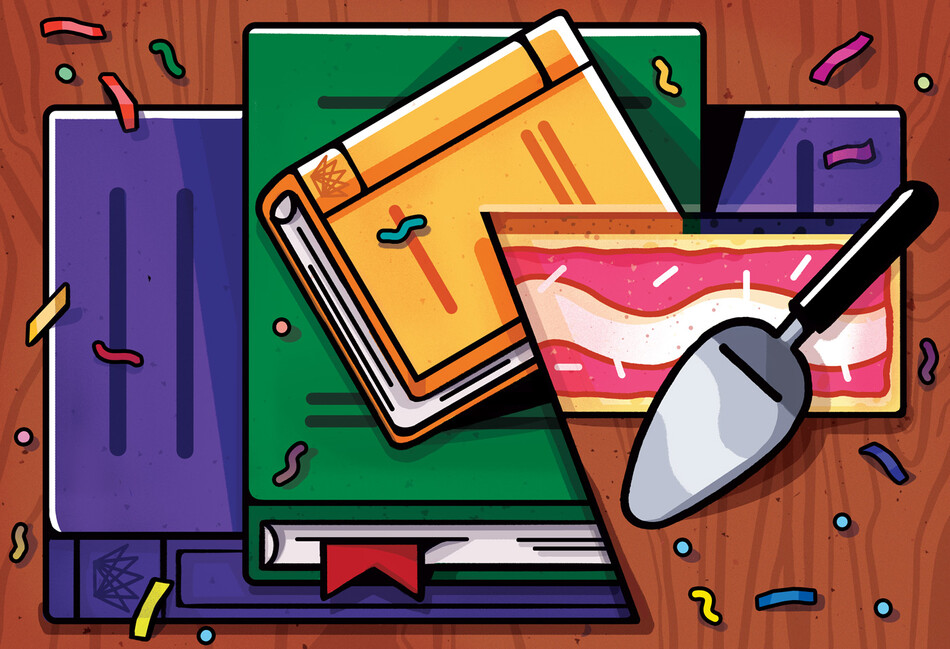The cake, encased in a plain cardboard box, was wheeled on a metal cart into the titanic exhibition space of the Javits Center. With the 2018 BookExpo America in full swing, the cake glided under the hanging banners of publishers large and small, along avenues formed by the stalls and tables of hundreds of exhibitors, past queues of badge-wearing conventioneers, past Ruth Westheimer ’70TC, who was signing copies of Roller-Coaster Grandma: The Amazing Story of Dr. Ruth (for ages eight through twelve), before arriving at the rarefied precincts of aisle 2700, home of the university presses.
The black-clad caterer pushing the cart stopped at the booth of Columbia University Press (CUP), located next to Harvard and across from Yale, Princeton, MIT, and Johns Hopkins. CUP, the fourth-oldest continuously operating university press (Hopkins was the first) was founded in 1893 by president Seth Low 1870CC and future president Nicholas Murray Butler 1882CC, 1884GSAS. The 125th would be observed with campus parties and an exhibit in Low Rotunda, but none of the treats for those occasions would make so grand an entrance. The caterer removed the cake from the box and set it on a bare table next to floor-to-ribcage stacks of copies of The Madhouse Effect: How Climate Change Denial Is Threatening Our Planet, Destroying Our Politics, and Driving Us Crazy and The Best American Magazine Writing 2017. CUP sales director Brad Hebel took up a yellow-handled cake knife and sank the blade.
The president and director of CUP, Jennifer Crewe ’79SOA, was in meetings, pinballing between the Javits Center and the CUP headquarters, tucked away on West 62nd Street near Lincoln Center. Crewe, who became director in 2014 — the first woman to head up an Ivy League university press — leads a staff of sixty in a humming paper-filled warren that includes a bookcase dedicated to all twenty-seven volumes of The Papers of Alexander Hamilton.
The press produces some two hundred books a year — about a quarter by Columbia faculty — and has a history of publishing eminent thinkers like philosophers Julia Kristeva and Gilles Deleuze, critics Jacques Barzun ’27CC, ’32GSAS and Lionel Trilling ’25CC, ’38GSAS, and Asian Studies pioneers Wm. Theodore de Bary ’41CC, ’53GSAS, ’94HON and Donald Keene ’42CC, ’49GSAS, ’97HON. Three US presidents — Wilson, Taft, and Truman — have been CUP authors. The press’s first book, published in 1894, was Classical Studies in Honour of Henry Drisler (Drisler 1839CC was a Columbia professor of classics). “We were founded as a separately incorporated, not-for-profit company to help disseminate the knowledge generated at Columbia,” says Crewe. “That meant publishing field-changing, research-extending books that no commercial publisher would touch.”
Today, CUP has an operating budget of $11.5 million, of which $1 million comes from the University. The rest is from sales. “We tweak our list so that we have enough books that will earn a surplus to offset works of scholarship that we know will lose money.”
When Crewe began working at CUP part-time as a graduate student in 1978, the press’s biggest seller was The Columbia Encyclopedia, which helped subsidize monographs on Tunisian cinema and Hegelian thought in France. Back then, the office was in McBain Hall, a freshman dorm on West 113th Street. After graduation, Crewe worked for two commercial publishers, then returned to CUP in 1986 as humanities editor. The press moved to West 62nd Street in 2000, just as the rise of the Internet caused the reference market to tank. “The University had to step in and bail us out,” Crewe says.
After Crewe’s predecessor as director, James D. Jordan, retired in 2013, Columbia conducted internal and external reviews, and both concluded that CUP should become part of the University — an idea that Crewe had always supported. And so on January 1, 2016, the press and the University were officially integrated, with provost John Coatsworth ratifying Low Library’s commitment to the union by assigning Crewe the additional title of associate provost.
Crewe sees big advantages to the relationship, including closer intellectual ties with the University and faculty, and an opportunity for CUP to start its own fundraising project with the help of the Office of Alumni and Development. That the printed word remains popular in the digital age is icing on the cake.
Crewe never did get a slice of the BookExpo birthday dessert. It was chocolate, the size and shape of an oversize coffee-table book, the dark frosting emblazoned in the center with a white CUP logo and the number “125.” As Brad Hebel cut the slab into perfect little squares, an imperceptible signal went out to the librarians, bloggers, salespeople, agents, and paper-company reps, who now gathered at the CUP stall for a needed sugar boost. Some had seconds. As Harry Truman, whose lectures at Columbia in 1959 were published by CUP as Truman Speaks, once said: “There’s nothing better than cake but more cake.”



